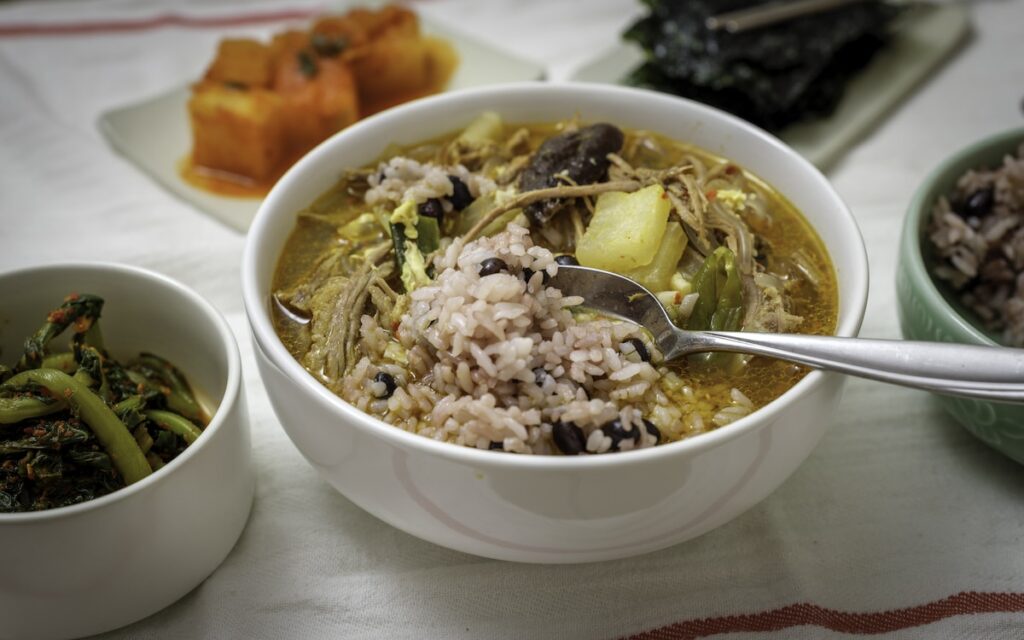20 Global Dishes With the Greatest Biodiversity Risks Include Meat-Based and Vegan Fare, Study Finds
3 min read
Traditional Korean spicy beef stew called yukgaejang. Sanghwan Kim / iStock / Getty Images Plus
Founded in 2005 as an Ohio-based environmental newspaper, EcoWatch is a digital platform dedicated to publishing quality, science-based content on environmental issues, causes, and solutions.
Our food choices can have substantial environmental impacts. According to the United Nations Environment Programme, worldwide food production — especially animal agriculture — is the main cause of biodiversity loss. One of the major reasons is that livestock and their feed require a great deal of land.
Certain foods — such as Indian kidney bean curry, Brazilian steak and lechazo, a Spanish dish made with lamb — have an outsized biodiversity footprint, a new study has found.
“Brazilian cattle, for example, need a lot of space. So do Spanish lambs,” said Roman Carrasco, one of the authors of the study and an associate professor in the department of biological sciences at the National University of Singapore (NUS), as The Guardian reported.
Scientists from NUS used prior research data identifying how certain crops encroached on the ranges of mammals, amphibians and birds to estimate how 151 popular international dishes affect biodiversity, the Public Library of Science (PLOS) said.
The dishes were taken from TasteAtlas.com and CNN.com, with each dish standardized to be 825 kilocalories.
The study, “Biodiversity footprints of 151 popular dishes from around the world,” was published in the journal PLOS One.
The research team calculated each ingredient’s biodiversity footprint by examining the conservation status, range and richness of the wild mammals, amphibians and birds within each product’s agricultural land area, PLOS explained. The scientists then combined the footprint of each ingredient to come up with a total biodiversity imprint for each dish. The footprint scores changed depending on whether an ingredient had been sourced globally or locally, farmed on a small scale or industrially.
“The study highlights particular problems for dishes using ingredients from tropical areas rich in biodiversity, including Brazil and Mexico,” said lead author of the study Elissa Cheng, an NUS life science graduate, as reported by The Guardian.
According to the study, the 20 dishes with the biggest biodiversity footprints were both meat-based and vegan, including yukgaejang — Korean vegetable and spicy beef stew; salsa verde pork; several Brazilian steak dishes; caldo de pollo, or chicken soup; and vegan dishes like rajma — kidney bean curry; dal; idli — fermented savory rice cake; and chana masala, a chickpea curry.
The dishes with the largest footprints tended to be made with beef, chicken, legumes and rice. Legumes and rice grown industrially for vegetarian and vegan dishes from the Indian subcontinent tended to have particularly strong effects on threatened species and biodiversity indicators related to range.
High biodiversity impacts were also found to result from lamb and Brazilian beef dishes because of the conversion of diverse ecosystems like the Amazon rainforest to pasture lands.
The smallest biodiversity footprints mostly came from starchy vegan and vegetarian dishes with a base of potato or grain, such as pommes frites, kartoffelpuffer — German potato pancake — triple cooked chips and baguettes.
The researchers looked at mammals, amphibians and birds specifically without differentiating between wildlife with certain habitat requirements and those able to live in cultivated habitats. The research team said they focused on dishes from nations with a high gross domestic product and that they were not necessarily representative. They also noted that variations in recipes could lead to different outcomes.
“Small changes in the dish we choose to eat and where we get the ingredients from can go a long way in preventing species extinctions. In addition to the large footprint of beef and lamb dishes from countries containing biodiversity hotspots, vegetarian dishes from highly biodiverse and under strong human pressure countries, like India, can be also very detrimental for biodiversity,” the authors said.
Subscribe to get exclusive updates in our daily newsletter!
By signing up, you agree to the Terms of Use and Privacy Policy & to receive electronic communications from EcoWatch Media Group, which may include marketing promotions, advertisements and sponsored content.





